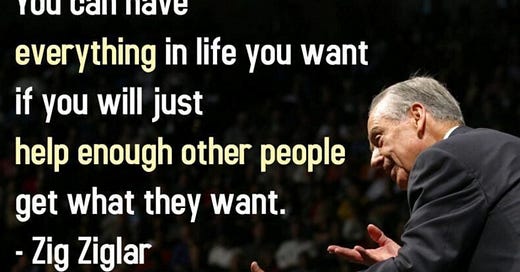#418: The Zig Ziglar Principle That Could Change How You Lead and Live
Beyond Reciprocity, A Misunderstood Principle
What if the key to getting everything you want in life had nothing to do with chasing your own goals, but everything to do with helping others reach theirs? Zig Ziglar, a renowned motivational speaker, left an indelible mark on personal development with his famous quote:
"You can get anything in life you want, if you just help enough others get what they want."
At first glance, this might seem like a transactional promise, a quid pro quo where helping others guarantees personal gain. However, a deeper exploration reveals that Ziglar’s philosophy is not about reciprocity but about embodying servant leadership, a selfless approach to creating value for others. This article explores why servant leadership, not the expectation of return, is the key to unlocking personal and collective success.
The phrase “you can get anything you want” often evokes images of a calculated exchange, help someone, and they’ll owe you. This interpretation aligns with reciprocity, a social norm where favors are given with the expectation of repayment. While reciprocity is powerful in human interactions, Ziglar’s philosophy transcends this tit-for-tat mindset. His quote isn’t a formula for manipulating outcomes; it’s a call to prioritize others’ needs without keeping score.
Reciprocity assumes a direct correlation between giving and receiving, often within a short timeframe. For example, you might help a colleague with a project, expecting them to return the favor later. Ziglar’s approach, however, doesn’t hinge on such guarantees. Instead, it emphasizes creating value for others as a way of life, trusting that personal success will follow organically. This shift in perspective, from transactional to transformational, sets the stage for understanding servant leadership.
The Heart of Servant Leadership
Robert K. Greenleaf, who coined the term in the 1970s, defined servant leadership as a philosophy where the primary motivation of a leader is to serve, placing the needs of others before their own ambition. It’s a leadership style that prioritizes the growth, well-being, and success of those around you, whether they’re employees, colleagues, or community members. Ziglar’s quote encapsulates this ethos perfectly: By helping others achieve their goals, you create an environment where everyone thrives, including yourself.
Unlike traditional leadership models focusing on authority or personal gain, servant leadership is rooted in humility, empathy, and commitment. A servant leader asks, “How can I help you succeed?” rather than “What can you do for me?” This mindset aligns with Ziglar’s philosophy, where helping others is its reward, fostering trust and collaboration. When you genuinely invest in others’ success, you build stronger relationships and a reputation for uplifting those around you.
Why It Works: The Ripple Effect
Ziglar’s principle thrives because it creates a ripple effect. When you help others without expecting immediate returns, you contribute to a culture of generosity and mutual support. This can manifest in countless ways: mentoring a junior colleague, sharing knowledge freely, or solving a client’s problem with genuine care. Over time, these actions build trust, loyalty, and goodwill, often leading to opportunities you couldn’t have orchestrated.
Consider a business owner who prioritizes customer satisfaction over short-term profits. They earn referrals, repeat business, and a stellar reputation by going above and beyond to meet clients’ needs. Their success isn’t the result of demanding reciprocity but of serving others consistently. Similarly, in personal life, helping a friend through a tough time might deepen your bond, creating a network of support that benefits everyone involved.
This ripple effect also explains why Ziglar’s philosophy isn’t about immediate gratification. Servant leadership requires patience, as the “returns” may come indirectly or years later. Yet, the cumulative impact of helping others compounds, creating a life rich in relationships, opportunities, and fulfillment.
Practical Steps to Live Ziglar’s Philosophy
Embracing Ziglar’s wisdom through servant leadership doesn’t require grand gestures. Small, intentional actions can make a significant impact. Here are a few ways to start:
Listen Actively: Take time to understand others’ needs and aspirations, find out what their “why” is.. Listening is the foundation of effective service.
Offer Value Freely: Share your expertise, time, or resources without expecting anything in return. You could achieve this by mentoring, volunteering, or solving a problem for someone.
Celebrate Others’ Success: Take genuine joy in others’ achievements. Amplifying their wins fosters a positive, collaborative environment.
Stay Consistent: Servant leadership is a lifestyle, not a one-off act. Make helping others a daily habit, regardless of immediate outcomes.
Reflect on Impact: Periodically assess how your actions have helped others. Taking this time to reflect reinforces the value of your efforts and keeps you aligned with Ziglar’s philosophy. No, you’re not keeping score, but it’s like a gratitude journal. Reflecting on the good you have done is a great way to build your self-esteem and internal motivation.
The True Reward: A Life of Purpose
Ziglar’s quote isn’t a promise of material wealth or instant success. Instead, it’s an invitation to live with purpose, integrity, and impact. By embracing servant leadership, you create a legacy of positive change, where your success is intertwined with the success of those around you. The “anything you want” Ziglar speaks of isn’t just about personal gain; it’s about a life rich in meaning, built on the foundation of lifting others.
Ziglar’s philosophy is a refreshing reminder that true success comes from serving others in a world often driven by self-interest. It’s not about what you can get in return, but how much you can give. By helping enough others get what they want, you don’t just achieve your goals, you inspire a cycle of growth and goodwill that transforms lives, including yours.
So ask yourself today:
Who can you help, without expectation? That small choice might just change everything.




